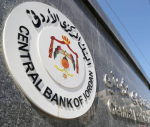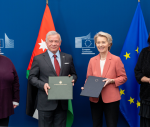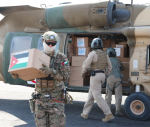You are here
Kadhimi’s political survival hinges on outcome of Washington trip
Jul 27,2021 - Last updated at Jul 27,2021
Beyond the traditional photo ops and the carefully chosen remarks praising the strategic relationship between the US and Iraq, it is what will be talked about behind closed doors between President Joe Biden and Iraqi Prime Minister Mustafa Al Kadhimi at the White House on Monday that will really matter. At stake is the political survival of Kadhimi himself, more than a year after he assumed office and three months before Iraqis hold a crucial legislative election that promises to change the trajectory of Iraq’s fledgling and beleaguered democracy.
Kadhimi is walking a tight rope as he tries to preserve Iraq’s military and economic bond with the US while hoping to appease pro-Iran political players who want American troops to leave the country 18 years after what is now perceived as an ill chosen decision by president George W. Bush and his neoconservative aides to invade the country and change the regime.
Before he left Baghdad, Kadhimi declared that Iraq no longer needed US combat troops or coalition military bases and that all it needed was training and intelligence sharing to confront Daesh. In recent weeks pro-Iranian militias in Iraq had intensified drone and missile attacks on bases where US troops are located. The US had carried out surgical aerial strikes against key positions of such militias. Now Kadhimi, in an attempt to placate his political foes and Tehran, wants Biden to commit to a timetable for US military withdrawal. But Kadhimi is also aware that a quick US withdrawal at this sensitive time may resemble an Afghan scenario currently taking place in the wake of a US pullout. The question is who will benefit from an American military withdrawal from Iraq?
There are a couple of thousand US troops remaining in Iraq. Their main mission is to help the Iraqi army, and by extension the notorious Popular Mobilisation Units (PMU), deal with remnants of Daesh terrorists. Since their defeat in 2017, Daesh fighters have been regrouping along the Iraqi-Syrian borders. They have launched deadly attacks against Iraqi army personnel and civilian targets including, a week ago, a suicide attack on Sadr City that killed over 35 people a day before Eid Al Adha.
The strategic dialogue between Iraq and the US has been taking place while Washington and its western allies have been meeting in Vienna to try to salvage the Iran nuclear deal. Tehran is using its proxy militias in Iraq to put pressure on the Americans. Kadhimi wants to take Iraq out of such a showdown. But while he may persuade Biden to commit to a timetable for withdrawal, he will have a tough time convincing the Iranians to stay out of Iraqi politics.
It is for Biden and his top aides to come out with a clear strategy concerning America’s objectives in Iraq, now that the war authorisation act has been repealed. America’s Arab allies have been trying to woo Iraq into rejoining the Arab fold, a vague term that is difficult to explain as the region undergoes geopolitical upsets, many of which have to do with Iranian interference.
Jordan and Egypt have joined an alliance with Iraq under what Kadhimi has called a “new Levant” which seeks to create an economic bloc that may one day include Syria. King Abdullah, in his recent visit to Washington, has urged Biden to back Kadhimi’s efforts to steer away from Iran.
Even if Kadhimi gets a commitment from Biden on US withdrawal he will still have to deal with his Kurdish partners in the autonomous Iraqi Kurdistan, where officials are opposing US military withdrawal, saying the Iraqi army is not ready to deal with Daesh while the country remains politically unstable.
If Kadhimi gets his way there are no guarantees that he can still survive the October polls. The populist Shiite leader Muqtada Al Sadr announced last week that he will not contest the elections nor will he back any candidate. How that will affect Kadhimi’s chances remains to be seen. Meanwhile, Iraq continues to suffer from a myriad of challenges including the killing of anti-Iran reformers and activists, power outage and water scarcity in addition to massive unemployment, official corruption and a coronavirus pandemic.
The road to Iraq’s recovery is long and while the upcoming elections could present a watershed there are still questions regarding Iranian influence on the political process and the failing ethno-sectarian system, which appears to dominate coalitions and lists running in the 10 October polls. Kadhimi may strike a symbolic win in Washington but the hurdles that lie ahead will prove difficult to negotiate.
Osama Al Sharif is a journalist and political commentator based in Amman













